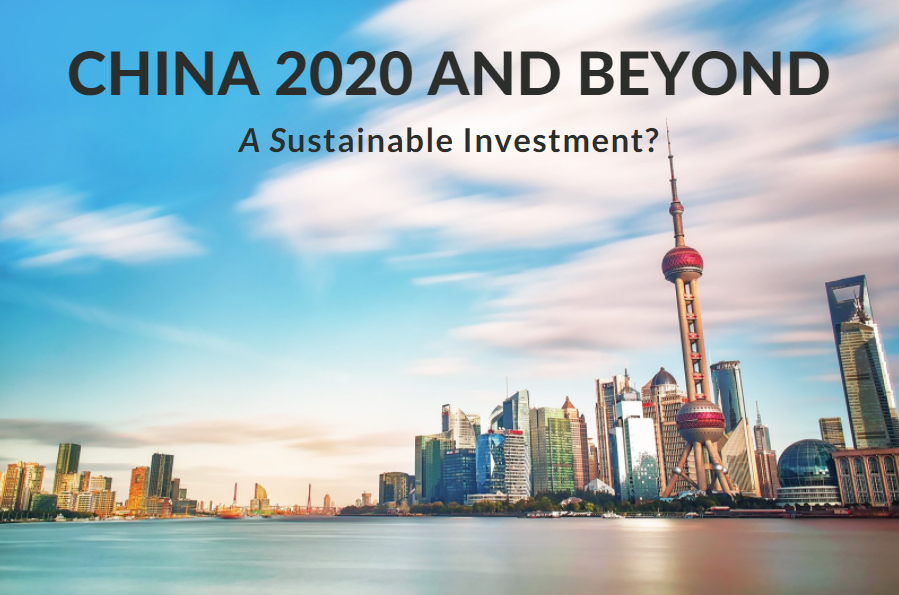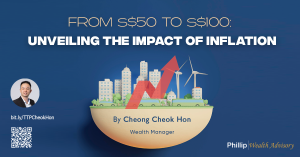China 2020 and Beyond – A Sustainable Investment? August 28, 2020

Summary
- China’s recovery from the COVID-19 pandemic has placed it on the path of becoming one of the only major economies with positive GDP growth in the year 2020.
- The CSI 300 Index, a capitalisation-weighted stock market index tracking the performance of the top 300 stocks traded on the Shanghai Stock Exchange and the Shenzhen Stock Exchange, has been up by about 14.9% this year.
- Companies from China are proving to be a strong competitor to its western counterparts in areas such as E-commerce and Technology.
- Relationship between China and United States will continue to be a cause for concern for investors investing in China
Introduction
China’s swift action in combating COVID-19
The COVID-19 pandemic has definitely caught the world by surprise. While the dust has certainly yet to settle, there has been some form of reprieve. Although many countries have made significant progress in battling the virus, the fight will have to continue until a possible vaccine is found. Multiple vaccines may be required together with mass production. One such country that has come a long way is China. Since the initial outbreak in China last December, the country has progressively reduced the number of cases. Despite a recent scare of a possible second wave of spread in Beijing, China has generally done a decent job in keeping the situation under control.1
COVID-19 spares none
The impact of the COVID-19 pandemic has been widespread, incurring social, political, and economical damages. The crisis is novel not only for its magnitude, but also for the speed at which the economy and labour markets are affected.2 Its impact on the labour market has thus far been devastating. In Singapore, the Ministry of Trade and Industry (MTI) has forecasted GDP in 2020 to be between -7% to -4%.3 Preliminary data from Ministry of Manpower (MOM) showed that overall unemployment rate rose to 2.9% while total employment fell more than four-fold.4
China’s recovery
Strong rebound in China
While extreme measures to control the spread of the virus has worked in China, its economy has suffered as well. China’s GDP in the first quarter drop by 6.8%, but rebounded and rose 3.2% in the second quarter, compared to a year ago. In fact, the International Monetary Fund (IMF) forecasted that China will be the only major country with positive growth in year 2020 albeit at a low rate of 1%.5 The speed of its economic recovery has placed China in a very strong position to further compete with United States on the global front. Aggressive testing and contact tracing, together with strong support from the Chinese government has placed China in a favourable position to lead the global economy. Consumer spending in China has returned but with a shift towards the online space. There is also increased spending in services related to healthcare and wellness. The pandemic has accelerated digitalisation and e-commerce growth, and China is on track to take full advantage.
China’s market strong performance despite COVID-19 pandemic
With the pandemic largely under control in China, the increase in domestic consumption and confidence has also flowed into the stock market. China’s stock market has rebounded strongly. The CSI 300 Index which is a free float weighted index that consists of 300 A-Shares listed on the Shanghai or the Shenzhen Stock exchanges has risen about 14% since the start of the year. In comparison, the S&P 500 index is still on its way to regaining losses after it fell in February. The strong gains on the CSI 300 may suggest that investors sentiments in China are much more positive. Despite the ongoing tensions between China and the United States, Chinese investors have been largely unfazed by the relationship between these two superpowers. While there may be restrictions to non-Chinese investors investing in China’s financial market, there are alternative investments that also track or invest in China.
China’s emergence and growing presence
Online shopping and Chinese companies
With safety measures in place, many daily activities will have to be done in a different manner. One obvious change is the switch online shopping. In China, while overall retail sales were down compared to last year, online retail sales which accounts for nearly 20% of the total retail sales were up by 7% in the first half of this year.6 To put things in perspective, retail sales in first half of the year amounted to about USD 2.1 billion, with about USD 700 million coming from the online retail space. E-Commerce companies like Alibaba, JD.com, PingDuoDuo and Tencent stand to gain from this digital shift. These companies were already pushing the boundaries and disrupting existing business models even before the pandemic. With healthcare measures likely to stay in the foreseeable future, these companies will continue to take the lead. In addition, the Chinese are also looking to have a piece of the pie in the innovation and technology space. Chinese companies like BYD, NIO and the recently IPO Li Auto are stepping up and bringing the challenge to bigger companies in the States like Tesla and General Motors.
Increasing FDIs and access to the Chinese market
Foreign Direct Investment (FDI) from United States has also continued to flow into China despite the obvious tension between these two countries. FDI from the States to China rose 6% in the first half of the year.7 The Chinese government also eased restrictions on FDI, further opening up its manufacturing and financial services sector to FDI.8 Such easing of restrictions with more to come in the future bodes well for the economic and financial growth of China. With easier access to the market in China, foreign investors will push the global market to be much more competitive and efficient, leading to greater benefits for consumers.
Gaining exposure to China’s market
Exchange Traded Funds
There are several Exchange Traded Funds (ETFs) listed in United States that exposes investors to the Chinese market. Funds like KWEB allow access to Chinese internet companies that provide similar services like Amazon, Google, Facebook, Youtube. Other ETFs like MCHI offer greater market exposure to the China markets.
| ETF | Kraneshares CSI China Internet ETF | Ishares MSCI China ETF | Global X MSCI China Consumer Discretionary ETF |
| Ticker | KWEB | MCHI | CHIQ |
| Exchange | NYSE Arca | NASDAQ | NYSE Arca |
| AUM | USD 2.69 billion | USD 5.79 billion | USD 182.16 million |
| Expense Ratio | 0.76% | 0.59% | 0.65% |
| Number of Holdings | 48 | 555 | 66 |
| Top 3 Holdings |
|
|
|
Investors can also seek direct exposure into the Chinese market through these ETFs listed on the Hong Kong Stock Exchange.
| ETF | CSOP FTSE China A50 ETF | ChinaAMC CSI 300 Index ETF |
| Ticker | RMB:82822 HKD 2822 | RMB: 83188 HKD: 3188 |
| Exchange | HKEX | HKEX |
| AUM | USD 1.7 billion | USD 1.9 billion |
| Expense Ratio | 1.77% | 0.83% |
| Number of Holdings | 51 | 300 |
| Top 3 Holdings |
|
|
Conclusion
The Chinese economy has come a long way since the Chinese economic reform in 1978. China overtook Japan as the world’s second largest economy in 2010.9 As countries around the world including China tackles the health, social, political and economic impact of the COVID-19 pandemic, China will also have to deal with the constant uncertainty surrounding its relationship with the world largest economy – the United States. Investors seeking investment opportunities in the large Chinese market will have to be mindful of the situation developing between China and the United States.
The emergence of Chinese tech-giants like Alibaba, Tencent and Baidu has made headway for investors looking for investment in other Chinese companies. Earlier in June this year, FTSE Russell successfully completed its inclusion of China A shares into their global equity benchmark. This is evidence of how the Chinese market has evolved over the years and gained attention from global investors.
Even though a vaccine has yet to be found and a full economic recovery is probably still far, the Chinese market and its lists of Chinese companies listed in the various global markets will remain as promising investment opportunities for global investors.
Reference:
- [1] https://www.straitstimes.com/asia/east-asia/beijings-coronavirus-outbreak-under-control-chinese-expert-says
- [2] https://www.imf.org/en/Publications/WP/Issues/2020/07/10/Tracking-the-Economic-Impact-of-COVID-19-and-Mitigation-Policies-in-Europe-and-the-United-49553
- [3] https://www.mti.gov.sg/-/media/MTI/Resources/Economic-Survey-of-Singapore/2020/Economic-Survey-of-Singapore-First-Quarter-2020/PR_1Q20.pdf
- [4] https://www.channelnewsasia.com/news/singapore/covid-19-singapore-unemployment-highest-retrenchment-doubles-12971904
- [5] https://www.imf.org/external/datamapper/NGDP_RPCH@WEO/OEMDC/ADVEC/WEOWORLD
- [6] https://www.chinainternetwatch.com/30910/retail-sales/
- [7] https://www.scmp.com/economy/china-economy/article/3093686/us-investors-still-piling-fdi-money-china-despite-rising
- [8] https://www.reuters.com/article/us-china-economy-investment/china-to-ease-foreign-investment-restrictions-on-several-more-sectors-paper-idUSKBN1JF04S
- [9] https://www.nytimes.com/2010/08/16/business/global/16yuan.html
Disclaimer
These commentaries are intended for general circulation. It does not have regard to the specific investment objectives, financial situation and particular needs of any person who may receive this document. Accordingly, no warranty whatsoever is given and no liability whatsoever is accepted for any loss arising whether directly or indirectly as a result of any person acting based on this information. Opinions expressed in these commentaries are subject to change without notice. Investments are subject to investment risks including the possible loss of the principal amount invested. The value of the units and the income from them may fall as well as rise. Past performance figures as well as any projection or forecast used in these commentaries are not necessarily indicative of future or likely performance. Phillip Securities Pte Ltd (PSPL), its directors, connected persons or employees may from time to time have an interest in the financial instruments mentioned in these commentaries. Investors may wish to seek advice from a financial adviser before investing. In the event that investors choose not to seek advice from a financial adviser, they should consider whether the investment is suitable for them.
The information contained in these commentaries has been obtained from public sources which PSPL has no reason to believe are unreliable and any analysis, forecasts, projections, expectations and opinions (collectively the “Research”) contained in these commentaries are based on such information and are expressions of belief only. PSPL has not verified this information and no representation or warranty, express or implied, is made that such information or Research is accurate, complete or verified or should be relied upon as such. Any such information or Research contained in these commentaries are subject to change, and PSPL shall not have any responsibility to maintain the information or Research made available or to supply any corrections, updates or releases in connection therewith. In no event will PSPL be liable for any special, indirect, incidental or consequential damages which may be incurred from the use of the information or Research made available, even if it has been advised of the possibility of such damages. The companies and their employees mentioned in these commentaries cannot be held liable for any errors, inaccuracies and/or omissions howsoever caused. Any opinion or advice herein is made on a general basis and is subject to change without notice. The information provided in these commentaries may contain optimistic statements regarding future events or future financial performance of countries, markets or companies. You must make your own financial assessment of the relevance, accuracy and adequacy of the information provided in these commentaries.
Views and any strategies described in these commentaries may not be suitable for all investors. Opinions expressed herein may differ from the opinions expressed by other units of PSPL or its connected persons and associates. Any reference to or discussion of investment products or commodities in these commentaries is purely for illustrative purposes only and must not be construed as a recommendation, an offer or solicitation for the subscription, purchase or sale of the investment products or commodities mentioned.
About the author
Mr Tan Chow Han
Investment Consultant
Mr Tan Chow Han is an Investment Consultant with Phillip Securities Pte Ltd since 2017. He believes in applying both fundamental and technical analysis in investing as well as investing for the long term. He believes in investing in companies you know and trust. He also places emphasis on building and maintaining investor relationships. Besides his consultant role, Chow Han frequently conducts educational seminars with the objective of imparting financial knowledge to the public. He has also featured in Phillip Securities Youtube Channel. Chow Han graduated from National University of Singapore with a Bachelor of Social Science (Hons), majoring in Economics with specialisation in Financial and Monetary Economics.

 Back in Business: The Return of IPOs & Top Traded Counters in March 2024
Back in Business: The Return of IPOs & Top Traded Counters in March 2024  From $50 to $100: Unveiling the Impact of Inflation
From $50 to $100: Unveiling the Impact of Inflation  How to soar higher with Positive Carry!
How to soar higher with Positive Carry!  Why 2024 Offers A Small Window of Opportunity and How to Position Yourself to Capture It
Why 2024 Offers A Small Window of Opportunity and How to Position Yourself to Capture It 









